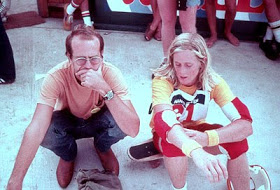Skateboarding icon Stacy Peralta and Switch Magazine’s Emerson Brown discuss Peralta’s award-winning skateboarding documentary Dogtown and Z-boys.
EB: When you left skateboarding to pursue your film career did you always intend to tell the story of Dogtown and Z-boys?

Stacy Peralta: No, you know it’s weird. I’d always had in the back of my head that the Dogtown story would make a great fictional film. But, I also always wanted to be the first one who did some historical film on skateboarding. In the late eighties, George Powell and I started buying up a lot of historical skateboard footage.
EB: Oh, really?
Stacy Peralta: Yeah, because I was planning at the time on doing a historical skateboard film. But, it just never happened. But nonetheless we had bought this library, so it was always in the back of my head that someday I wanted to do something. And, it just turned out the Dogtown story was there and it was a really good one to tell. And it had all the footage and it had all the people to make a complete story with. So that was the reason for it.
EB: So, that’s why it evolved into a documentary then?
Stacy Peralta: Well, it evolved into a documentary because Hollywood was actually interested in pursuing, and they were pursuing a fictional film on Dogtown. So, we were able to use their interest as cache to get someone to finance this film. And that’s how we did it.
EB: Do you feel it’s ironic, then, that you got your first success in life through skateboarding and now as a filmmaker you have your first widely recognized success with this film? Or is it just natural to you?
Stacy Peralta: It’s a good question because I think that a lot of the greatest opportunities in my life have come as a result of skateboarding. I feel like I’ve given a lot back to the sport, but I feel that the sport has given me so much. And, I think that’s a good insight of yours. Making this film has opened a lot doors. I became a filmmaker because I wanted to make skateboard videos; I didn’t start skateboard videos because I wanted to be a filmmaker. So, I became a filmmaker as a result of the fact that I had to make these skateboard videos. It’s basically taught me everything I know as a professional.
EB: You mention in the film that you didn’t develop until you were behind the scenes at Powell. Is this kind of what you’re referring to, or could you elaborate on that a little bit?
Stacy Peralta: The thing that I was saying was that I was never super comfortable being a skateboard star. What I really felt more effective at was being behind the scenes and doing the advertising, making the videos, running the team, strategizing for the company.

I felt that I got so much more done when I was the guy pulling the strings than when I was just the guy out there in front being the skateboarder. And, I liked it that way. I preferred being behind Tony Hawk, and being behind Steve Caballero, being behind Lance Mountain and those guys. I just enjoyed it more. There was more opportunity for me.
EB: You felt more comfortable in that role?
Stacy Peralta: I was not only more comfortable, I really relished all the opportunities and responsibilities that I had.
EB: Speaking of that role and your essentially being a mentor to young skaters, you’ve said that you want young skaters to see this film. Do you think skateboarding culture has instilled within itself an appreciation for its past? Or do you think it’s more like pop music and everybody is continually looking for the next big thing?
Stacy Peralta: I think it’s both. I think the kids are certainly looking for the next big thing. But, what has surprised me is a couple of things that happened that made me realize that people both old and young took the film seriously. Number one, there were a couple of kids on my block that, after having seen the film, went out and made their own wooden boards. I couldn’t believe it. They started doing birds on the ground and slides. That made me realize, wow, these kids really connected. They really got it. And to make your own skateboard is a very personal thing for a kid to do because it puts him in touch with what that board’s about.
EB: It’s almost like shaping your own surfboard.

Stacy Peralta: Exactly. I thought that was really, really special. The other thing is a lot of adults that formally used to skateboard that now have kids are starting to skateboard again because they’re starting to realize there’s a part of their life that’s missing. The local skateboard shop recently told me that all these 45-year-old guys are coming in the shop going “I want to buy a skateboard.” And they’re just doing it to roll around and feel that feeling of movement again. The thing is there’s never been a historical skateboard film before. So, this was the first one and it was just a matter of letting it out there.
EB: Regarding history and skateboardingÉIn this film, style is everything. You’ve inferred in some things you’ve said that style isn’t as important in skateboarding today. I wondered what you meant by that.
Stacy Peralta: We live in the age of extremism. Today, going big is all that matters. Because of the danger of the tricks these guys are doing, they don’t really have time to look particularly graceful or aesthetically pleasing when they’re doing it because they have one foot over the back truck and the other foot over the front truck. And it’s all about going as high or as far or as big as you can. In our day, it wasn’t about going big. It was about really looking good and having your soul exposed while you were skateboarding because the way you skated was clearly a manifestation of who you were. It was just a difference. It’s not to say one’s better than the other, but at some point the two are going to hybridize together, and it’s going to make something altogether new.
EB: Then how do you feel about having your film kind of being marketed as the birth of extreme then?
Stacy Peralta: I don’t know if it’s the birth. It’s one link of the birth. Big wave surfing happened way before us, and that was probably the moment that the extreme happened. Certainly, vertical pool riding was one of the arms, but it wasn’t the only arm. It was not THE birth of the extreme.
EB: This is obviously a good film. It’s won many accolades. I heard something in a review, however, and was always curious how you would respond to it. You said you always had nightmares that people would think you were banging your own drum with this film.

Stacy Peralta: Right.
EB: (The critic) said that the subjects of the film almost seemed arrogant and borderline annoying.
Stacy Peralta: (laughter)
EB: He went on to say that the film might have benefited from some more introspection, so I thought that related to your fear. So, could you respond to that?
Stacy Peralta: I’ll respond to one part of it first, and tell me if it covers what you’re asking. Number one, I never expected the film to succeed as it did. And, being a skateboarder for my whole life, I’ve been an underdog my whole life in regard to this sport. It’s been a sport that’s gotten very little respect outside of itself. So, we definitely banged our drum in this film harder than we probably should have. Had I known the film was going to have the audience that it eventually did, had I know that it was going to succeed, I wouldn’t have allowed us to bang so hard. But since we’re such underdogs, I felt we had to bang loud so people would pay attention to us. We banged harder than we needed to, certainly. And I ‘fess that up absolutely. I don’t know if that answers your question.
EB: It does.
Stacy Peralta: I will say one thing, not in (the critic’s) defense. I know he felt perhaps it could have been made better by an outsider, but this was an intimate portrait by somebody that was on the inside. So, it’s being told a different way. I guess he’s chastising me for not making the film another way, which I chose not to do.
EB: I think he references some of things Jay Adams brought up about the bad opportunities skateboarding presented. He wanted more of this and you said that you wouldn’t have gone in that direction if Jay hadn’t volunteered.
Stacy Peralta: Yeah, Jay went that way.
EB: You only had about six months to make this film. Is there anything that you couldn’t get into the film that you really would have liked to?
Stacy Peralta: At the time there wasn’t. But if I was to go back now, I’m sure there’s aspects that I would have liked to have spent more time on or investigated further. What they are right now, I’m not really quite sure. From time to time I’ll think, “oh, yeah, it would have been nice to do such and such.” But, all in all, I gotta be honest with you, I’m very happy with the film. I wanted this thing to be an entertaining celebration of a subculture. I didn’t want it to be a slow methodical film. I wanted it to fly really quickly and be a lot of fun, and to be kind of subversive looking. That was the goal that we set out to do.

EB: Tell us about your next project. In Search of Captain Zero?
Stacy Peralta: Yes, it’s being adapted from a book into screenplay form. I’m set to direct. Sean Penn is producing and also set to act. We’re working hard to get the screenplay into shape. I don’t want to give up on the documentary format, though, because I feel it’s a very rich format, and there’s a lot of films I’d like to tell in that medium. There’s one on big wave surfing that would go from Greg Knoll, the originator, all the way to Laird Hamilton. I would like to do a film like that. I’m talking to those people right now.
EB: Are you afraid of getting pigeonholed as a filmmaker, then? Skating, surfing…
Stacy Peralta: Well, no. In Search of Captain Zero, it has surfing in it, but it’s not a surfing film. So, in that regard I’m not afraid of it. But, I am afraid of being pigeonholed as a documentarian because I really want to be known as a filmmaker. That’s what I’m working towards.
EB: You said earlier that you felt like you’ve given a lot back to skateboarding. I would agree with that. But, what would you like your legacy to be considered as in regards to skateboarding?
Stacy Peralta: Someone who just loved skateboarding.
